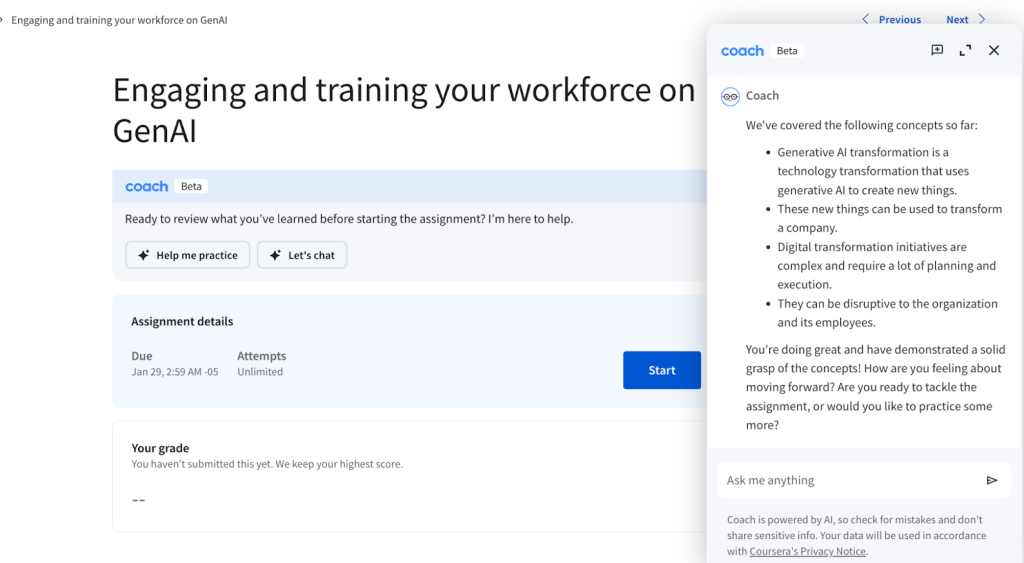
Using pedagogy and user research to take a learner-centered approach
Online education opens up a world of possibilities, enabling learners to acquire new skills and knowledge from anywhere, at their own pace. However, it can also present challenges, including staying motivated, balancing other life priorities, and overcoming roadblocks. At Coursera, we recognize these challenges and have been exploring ways to apply the power of generative artificial intelligence (GenAI) to help learners stay on track and achieve their goals.
To navigate the complexities of online learning, this new technology required a comprehensive pedagogical framework based on the science of learning and tutoring best practices while also having a contextual understanding of Coursera partners’ high-quality content.
Combining cutting-edge AI capabilities with the expertise of Coursera’s Teaching & Learning and Product teams, we launched an ambitious experiment: a learning assistant called Coursera Coach that offers tailored guidance and support, making the learning journey more enjoyable and empowering. This initiative has quickly grown in potential, now poised to become transformative for learners and a game-changer in online education.
Welcome from Coursera Coach in Foundations of Cybersecurity by Google
Coursera Coach’s methodological, interactive approach is aligned with Mastery Learning principles, providing frequent assessment, tailored feedback, and individualized pacing. These techniques ensure each learner achieves a solid understanding before moving on to more difficult topics. At each stage of Coursera Coach’s development, we have leveraged a multi-faceted approach, gathering learner feedback to iterate quickly.
Building Coursera Coach with learners for learners
Since its launch in 2023, Coursera Coach has evolved well beyond a simple question-and-answer tool. Through ongoing dialogue with our community and targeted research with learners, we have rapidly iterated on its functionality, delivering updates every few weeks to meet the specific needs of our learners. As Coursera Coach’s user base expanded, regular feedback sessions with learners have been instrumental in pinpointing the most impactful features, tailoring the experience to enhance accessibility, and aiding in efficient studying.
We have seen Coursera Coach become a welcome support for those new to a subject or looking to strengthen their learning habits, while also streamlining the process for more seasoned students. Coursera Coach does not just answer questions—it teaches learners how to learn, embedding skills like note-taking, real-world applications, and key concept recall. More than a year into building Coursera Coach, we have identified several core benefits, refined through continuous research and iterations. The positive responses and utility found in Coursera Coach underscore the effectiveness of combining GenAI with the science of learning in the pursuit of solving real learner needs.
Here, we explore Coursera Coach through four key use cases—simplifying concepts, boosting confidence, reducing isolation, and enhancing motivation—to illustrate the potential of an AI-powered tutor built on the science of effective learning.
Use case 1: Making complex concepts more accessible
One of the largest challenges for online learners is accessing help if they get stuck on a difficult concept. From our research, we know this can result in taking a break from the course and struggling to get back on track. Coursera Coach addresses this through in-the-moment support, breaking down complex ideas step-by-step and offering practical real-world examples. Learners can ask questions anytime to get unstuck quickly and continue making progress. By including this new functionality within courses on Coursera, we minimize learners’ need to look elsewhere and reduce their chances of losing momentum.
As one learner we surveyed said, “In lieu of an in-person instructor, Coursera Coach is the next best thing to get me answers to my questions and assist with the readings when I do not understand it.”
“Explain this topic” with Coursera Coach in Python Data Structures by University of Michigan
Importantly, learners can ask Coursera Coach as many questions as they’d like without feeling judged or embarrassed. As another learner said, “Coursera Coach is like having a smart best friend. They completely understand the course and have the patience and intelligence to break it down for you.” It’s an ever-present learning companion, ready to offer guidance whenever a learner faces obstacles, making the online learning experience more enjoyable and frictionless.
Use case 2: Strengthening confidence and mastery through recall
Before a learner attempts a graded assessment, Coursera Coach offers interactive practice to enhance their confidence and mastery of the material. We introduced this feature knowing learners want to apply their new knowledge as they learn and benefit from additional practice opportunities. Early in our research, learners expressed a desire not only to ask Coursera Coach questions but for the tutor to ask them questions to stimulate deeper reflection, a key element of Socratic learning. In our next iteration, we built the “Help Me Practice” feature with this framework in mind.
“Help me practice” with Coursera Coach in Navigating Generative AI: A CEO Playbook by Coursera
“Help me practice” sessions: In these interactions, Coursera Coach uses probing questions to guide learners’ thought processes, encouraging them to discover insights and formulate their own conclusions. This reflective and iterative process adapts to each learner’s level of mastery, gives them targeted feedback based on their answers, and progressively deepens their understanding. This approach allows learners to practice deliberately and assess their readiness to take the assessment. If they identify knowledge gaps, learners can continue practicing with Coursera Coach to refine their understanding and boost their confidence. Through learner research, we uncovered that this aspect of Coursera Coach enables learners without a background in what they were learning and those without strong foundational learning habits to build up the skills they needed. Even learners with more developed study skills are reporting the utility of this added practice. This is one example of how Coursera Coach can become a trusted ally to learners during their online education journey.

“Help me practice” with Coursera Coach in Navigating Generative AI: A CEO Playbook by Coursera
Use case 3: Providing emotional support and alleviating isolation
Coursera Coach’s role extends beyond providing practice—it acts as a supportive learning assistant that helps mitigate feelings of isolation and uncertainty that can be felt in online courses. Coursera Coach was first made to answer students’ questions, but our early research told us it did much more: learners felt like they had a friend and were no longer taking the course by themselves.
With Coursera Coach, learners gain a reliable companion in their educational journey. Providing emotional connection while learning can increase intrinsic motivation and boost learners’ confidence. Individuals can learn through observing, modeling, and interacting with others, which Coursera Coach now provides. Real-time support through natural language conversations offer a reassuring presence and can start to address the emotional needs of online learners as they progress through new concepts. This presence increases learners’ confidence in their ability to learn effectively and to achieve their career goals.
Use case 4: Boosting motivation through proven educational strategies
Coursera Coach is designed to emulate the best practices of human tutors, bringing sophisticated pedagogical strategies and practices into every interaction while delivering support that resonates with learners and fosters their growth.
Coursera Coach can play a crucial role in developing learners’ metacognitive skills, empowering them to become more self-aware and self-regulated learners. Specifically, Coursera Coach is designed to match learners’ needs at different stages, provide just-in-time feedback as they test their knowledge, and offer targeted guidance to update any misunderstandings. To supplement the course content, Coursera Coach can explain examples and explore concepts in more depth. With these additional interactions and support, Coursera Coach helps to build learners’ motivation and belief in themselves through acknowledgment of their efforts and successes. Ultimately, Coursera Coach empowers learners to take ownership of their journey, meeting them where they are and propelling their skill gains forward.
Next steps
As we look to the future, we are optimistic about the vast potential of Coursera Coach. This in-course functionality is already changing how learners around the world approach online education and enables us to offer many of the benefits of one-on-one tutoring at scale. The entire team working on Coursera Coach is committed to delivering the best possible learning assistant–one that opens doors to knowledge, career development, and personal growth like never before.
Coursera Coach is currently in beta phase and available to a subset of learners. Broader access will roll out later this year. Please visit the Coursera Blog to receive further updates.
Acknowledgments
Coursera Coach core team: Alice Wong, Milee Yu, Olwen Puralena, Sandra Ximena Delgado Betancourth, Oleg Musayeu, Kody Smith, Sophie Gao, Zhan Cheng, James Tyack, Mashrur Khan, Yash Kshirsagar, Rebecca Eng, Michele Bové, Kang Chen, Melody Liu, Scher Foord, Laura Bronson
Teaching & Learning additional support: Alexandra Urban, LinLin Xia, Christina Anderson
The post Coursera Coach: Leveraging GenAI to Empower Learners appeared first on Coursera Blog.
Article source: https://blog.coursera.org/coursera-coach-leveraging-genai-to-empower-learners/
